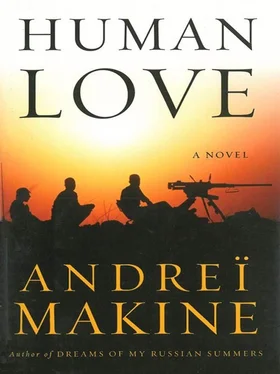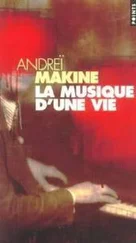“I THOUGHT I’D FORGOTTEN IT, THAT LANGUAGE. And then when I heard those idiots the words came back to me. In an instant. That’s all there was in our village: prisoners who’d been in the camps. They all dreamed of going off to a big city but they could never manage to get away. Those frozen lands held them captive. The truth is, they were scared of not being able to get back into normal life. For a start there was this lingo they spoke in the camps… So they stayed. Even one of my family…” Her voice broke off; she murmured with a clumsy change of intonation, “I’m called Anna…”
Elias introduced himself. This only added to the feeling of unreality. They were walking along beneath great cascades of falling snow, as if in the middle of a flapping sail. He had tied the scarf the young woman had lent him over his head. He let himself be guided, in the insane hope that in the end all that had happened would be miraculously made good. Those men for whom he was nothing but a monkey his shapka thrown in the fire, their hatred. In a country that promised a world without hatred…
“And these prisoners were common criminals, were they?” he asked. His voice betrayed his eager hope of a way out.
“No. The common criminals managed pretty well at making a fresh start. At least a thief knows why he s been put in prison. These were politicals. Absurd cases. A kolkhoznik had dumped some manure on his vegetable patch. It was just his luck that it was Stalins birthday, and they’d hung up his portrait on the house across the road. The fellow got twenty years. After serving his sentence he was still baffled by how a whole life can be buried under a pile of dung. Well, in fact, it was me that couldn’t understand how he could go on living. Because he did live. He went hunting now and then in the taiga. Even made a collection of dried plants… Or there was that student who, when he was taking notes, wrote down ‘SOSialism.’ For a joke. Someone denounced him. When he came back from the camp he was an old man…” She must have sensed a stifled cry in him and guessed that the pain did not come from the blows he had received. “I don’t know why I started telling you all that. Whatever you do, don’t repeat it to anyone! Oh yes. I was talking about the language of the camps…”
She’s afraid, thought Elias. This young woman, who had the courage to intervene just now, is afraid.
“So what did you say to those guys at the depot?” he asked her, assuming a relaxed tone. Anna’s voice responded casually echoing his own: “It was the fact that I was talking the convicts’ lingo that surprised them. Not the sense of what I was saying. You see, what mattered most of all to them was to put you down. Human society’s very similar to the animal world in this respect. I’ve studied it on my ethology course. Except that animals don’t use words to injure one of their own species… Here we are. We’ve arrived. Your hostel’s over there. Now I’m going to take the metro…”
She vanished into the white tempest. Elias took several steps, then ran to return her scarf to her and at the entrance to the metro stopped, stamping his feet amid the piles of snow. He felt himself becoming again what he was for that crowd of Muscovites: a tall black man, vaguely comic, his curly hair white with snowflakes.
He spent several days looking for her at Moscow University, wandering the corridors, waiting as they came out from lectures. This young woman’s own life, he understood, cast doubt upon that future world he had dreamed of. And yet it was she who gave this dream its simple, human, and tragic truth.
It’s not the fact that she’s beautiful … He often began in this way without finishing his thought when, after he’d found Anna again, he picked her out amid the rowdy throng of the students. Hiding behind a pillar in the main hall of the faculty he saw young women just as pretty and much better dressed than her. It was the start of the 1970s, the first post-Stalin generation was coming up to the age of twenty… He watched them passing, attracted glances, sometimes amused, sometimes scornful (the whole range of these expressions was familiar to him). And suddenly this long, shapeless black coat, these old shoes, their heaviness jarring with the slenderness of the ankles. The face looked severe, almost hostile. The eyes, slanting toward the temples, resembled those of a she-wolf.
No, it’s not her beauty…, thought Elias and hastened to go outside, to make his way toward an empty pathway, knowing that very soon he would hear footfalls behind him and would recognize them. A hand would slip round his arm and they would plunge into the maze of little streets over which a winter dusk was falling.
So many things about her should have displeased him! Her clothes, more suited to the peasant women laden with bundles who jostled one another in the railroad stations of Moscow. Her harsh voice, devoid of seductive musicality. The toughness that sometimes showed through the vulnerability of her youth.
With other women he had always known where he was going, what he expected of them, and what they hoped for from him. With her… Anna clasped his arm and they began walking at random, or not entirely so, for she was showing him a Moscow he would never have discovered on any map. They spoke little, without any logic, looking at one another through the rippling of the snow, in silence, as if after years of separation.
Was he right to hide, to wait for her outside in these empty, snow-filled pathways? Like a meeting between secret agents, he thought with a smile. She seemed to be grateful for his discretion. He was not unaware of what it signified in this country, the fact of “going out with a black man.” Sometimes, on the other hand, she showed herself indifferent to what people might think of them as a couple. As on that evening when she stopped in a courtyard beyond the reach of the city s hubbub. They could hear the rustle of the snow against the windows and the slow, grave notes of a piano. On the second floor of an apartment block the interior of a vast room, dimly lit, pictures on the walls and the silhouette of the person playing. People were coming into the courtyard, crossing it, going up to their homes. A few of them turned back to satisfy themselves that this young woman and this African, motionless beneath the falling snow, were not a mirage. Elias felt Annas fingers squeezing his hand. The life that could be guessed at behind the second-floor windows suddenly seemed to him very close to what the two of them could have lived together…
***
One day, when they were sitting in a tea shop, he asked her, with a little nod toward the other customers: “What do they think when they see us together?”
“If I tell you the truth, you’ll be upset…”
“Go ahead. I’m beginning to be immune.”
“Two schools of thought. The first think I’m simply a slut. The second think I’m a slut who wants to go abroad at any price. There… No, I almost forgot. There must be one charitable soul among them who thinks that in four generations a union such as ours might produce a new Pushkin…”
“You know, one of our instructors puts it with a bit more humor. A countrywoman comes to Moscow. For the first time in her life she sees a black man. ‘Oh, look, a monkey in the street!’ The black man remarks politely: ‘No, citizen. I’m an African.’ The countrywoman: ‘Ooh! And, what’s more, it’s a talking monkey’… After all, the Portuguese didn’t think any differently when they cut our heads off in ‘sixty-one.”
“Let’s leave! The way they’re looking at us makes me feel as if I had glue on my skin. I feel dirty.”
“But why?”
“Because I used to think more or less the same as them!”
Читать дальше









